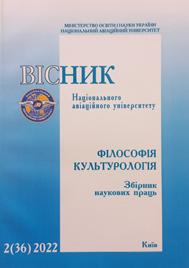DISCOURSE OF CRISIS COMMUNICATIONS: SOCIO-CULTURAL ANALYSIS
DOI:
https://doi.org/10.18372/2412-2157.36.16984Keywords:
crisis, crisis communications, crisis situation, crisis management, political crisisAbstract
Introduction. Crises of different origins can seriously damage the reputation of authorities and undermine their legitimacy. This is largely
due to the widespread use of the Internet, and web 2.0 technologies, in particular social media. Today, it is not the crisis incident itself that
plays a key role in social discontent, but the way information about it is communicated. Moreover, the turning point in the transition of an
event into a crisis often is not a physical action, but a communicative one. The aim of the study is to establish the peculiarities of the
deployment of crisis communications in the modern world. The tasks are to determine the essence of crisis and crisis communications and
to identify the main directions of their deployment. Research methodology includes a sociocultural methodological approach, methods of a
systematic analysis, comparison, and critical analysis. Research results. Any crisis situation requires the immediate influence of
management structures in conditions of increased uncertainty and escalation of events. Crisis phenomena are an integral element of the
political process, since politics, as a regulatory and control sphere of society, implies the presence of a constant clash of interests of
individuals and large social groups. A crisis situation, acting as a kind of violation of the traditional and usual state of affairs in the political
system of society, immediately attracts attention and causes concern on the part of citizens, since a political crisis carries a potential danger
to social stability. Crisis communications is an activity aimed at establishing effective interactions between the organization (authority) and
society in order to maintain its stable reputation and minimize reputational risks before, during, and after the impact of the crisis. Crisis
communications have in their arsenal special crisis (namely, diagnosis, directed forecasting, and crisis management) as well as adaptive
technologies. Discussion. Analyzing the activities of mass media in crisis situations, the latter act as a means of operational information, a
tool for influencing social consciousness, and a way of controlling social and political behavior. The main principles of effective crisis
communication: are the quick provision of information, consistency provided by a unified response, and openness. Conclusions. Crisis
management is largely determined by what kind of reality the crisis team createsin the social consciousness through communication. Each
crisis situation has a set of unique features, so the choice of a crisis communication model largely depends on the context in which the crisis
unfoldsl.
References
Ansoff, H. Igor, et al. Implanting strategic management. Springer, 2018.
Booth, Simon. Crisis Management Strategy: Competition and Change in Modern Enterprises (1st ed.). Routledge, 1993. https://doi.org/10.4324/9781315645674
Connor, Patrick E., and Linda K. Lake. Managing organizational change. Praeger Pub Text, 1994.
Coombs, W. Timothy and Sherry J. Holladay, 2011. The handbook of crisis communication. UK. John Wiley & Sons.
Dahrendorf, Ralf. 1994. "Elements of the theory of social conflict" Sociological studies. Sotsis 5.
Fearn-Banks, Kathleen. 2016. Crisis Communications: A Casebook Approach (5th ed.). Routledge. https://doi.org/10.4324/9781315684857
Fink, Steven Crisis Management: Planning for the Inevitable. New York: AMACOM, 1986.
Koraeus, Mats. 2008 Who knows? : The use of knowledge management in crisis [Internet]. Stockholm. Available from: http://urn.kb.se/resolve?urn=urn:nbn:se:fhs:diva-259
Larsson, Sara, Eva-Karin Olsson, and Britta Ramberg. 2005. Crisis decision making in the European Union. Swedish National
Defence College.
Limbu, Minu Kumar. 2012 "Integration of crowdsourced information with traditional crises and disaster management information using linked data".
Martin, Ryan M., and Lois A. Boynton. 2005. "From liftoff to landing: NASA's crisis communications and resulting media coverage
following the Challenger and Columbia tragedies". Public Relations Review 31.2. 253-261.
Mitroff, Ian I. Managing crises before they happen: What every executive and manager needs to know about crisis management.
AMACOM American Management Association, 2000.
Quarantelli, Enrico Louis. 2013. “Community crises: An exploratory comparison of the characteristics and consequences of disasters and riotsг”. Journal of contingencies and crisis management 1.2.
Абисова М. А. Комунікативний потенціал культурних відмінностей в інформаційному суспільстві. Вісник Національного
авіаційного університету. 2018. Вип. 1 (27). С. 39‒43. (Серія «Філософія. Культурологія»).
Акімович Є. В. 2018. Узагальнена модель кризових комунікацій органів державної влади у ситуаціях соціальної напруги. Теорії та проблеми політичних досліджень. 7.5 А.: 128-136.
Барсамов В. А. Динаміка суспільно-політичної кризи (теретичний та прикладний аналіз). М.: МІІТ, 2002.
Бергер, П., Т. Лукман. Соціальне конструювання реальності. М. : Луч, 1995. 240 c.
Голуб О. Ю. 2012. Кризові комунікації: методологія та методи управління. Саратов: Вісник Саратовського державноекономічного університету; 2012. С. 142-145.
Дротянко, Л. Г., Абисова, М. А., Пода, Т. А., Орденов, С.С. Філософія діалогу в комунікативних практиках інформаційного
суспільства. Талком; Talkom. 2020, 8-27.
Дэна Д. Преодоление разногласий: как улучшить взаимоотношения на работе и дома / перевод М. И. Смольникова.
СПб.: Ленато. Институт личности. Палантир, 1994. 138 с.
Ньюсом Даг, Терк Джуди Ван Слайк, Крукеберг Дин. Все о паблик рилейшнз / пер. с англ. М.: Консалтинговая группа
“Имидж-Контакт”: ИНФРА, 2001. 628 c.
Олещук П. Кризовi комунiкацiї у полiтичному дискурсi. https://social-science.uu.edu.ua/article/304
Пільгун Є. В. Семантика та прагматика кризового дискурсу. Мінськ : ІОЦ Мінфіну, 2020. 203 с.
Рапопорт А. Чи можуть дослідження світу бути прикладними? Теорія міжнародних відносин: Хрестоматія. М., 2002. С. 203-213.
Ставченко C. Динаміка політичних криз: управлінсько-технологічний вимір. Науково-теоретичний альманах Грані 25.2
: 82-87. DOI: 10.15421/172227
Улмер, Р., Селлнау, Т., Сиджер, М. Эффективная кризисная коммуникация: от кризиса к возможности. Харьков. Гуманитарный центр, 2011. 267 с.
Шапінська, Є. Н. Дискурсивний підхід. Питання соціальної теорії. 2008. Т. 2, вип. 1. С. 423-434

